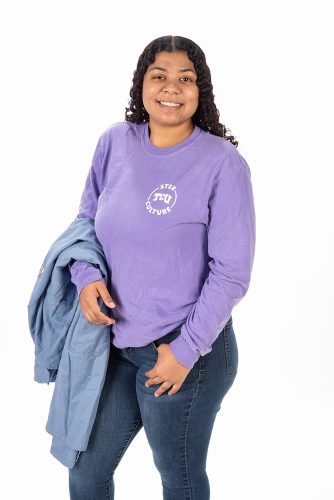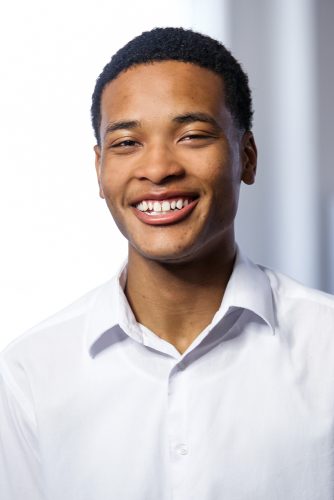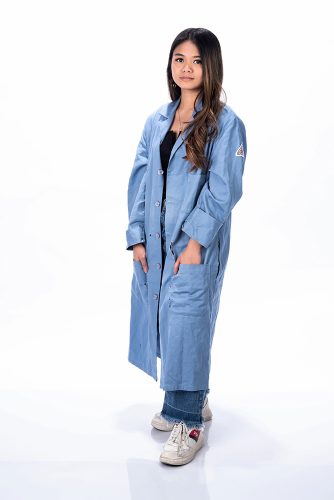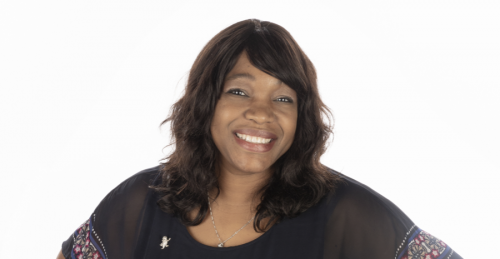
Photo by Glen E. Ellman
Helping STEM Bloom
TCU leaders are mentoring scholars of color for in-demand STEM jobs.
From age 5, Sabrina Jones knew she wanted to be a doctor. She’s on the way to realizing that dream after landing a coveted spot in TCU’s STEM Scholar Program.

Sabrina Jones, a junior biology major, lived through a rare skin condition as a child. The experience spurred her interest in the medical field. Photo by Glen E. Ellman
But the junior biology major, whose mother is white and father is Black, didn’t envision the culture shock awaiting her on campus.
“No one looked like me,” Jones said.
She said the science, technology, engineering and mathematics programs — the STEM subjects — must improve the representation of women of color at TCU and beyond.
Black and Latinx people in particular are underrepresented among the estimated 19 million STEM professionals nationwide. While women in general outnumber men in obtaining higher education degrees today and have made progress in health care, they are still underrepresented in other segments of STEM jobs.
At TCU, the 895 STEM students of color made up roughly a quarter of all students in those majors in 2021.
Underrepresentation means certain groups of people may be excluded from opportunities for career development and financial security. STEM jobs are among the nation’s highest paying and fastest growing — the federal government forecasts that the economy will add positions in those fields two times faster than for occupations overall through 2029.
“When we’re looking at the workforce, the jobs of the future are in STEM,” said Zoranna Taylor Jones ’98 (MS ’07), assistant dean for TCU’s College of Science & Engineering and director of the STEM Scholar Program. “How do we meet the needs of this growing workforce? In the United States, we’ve had to recruit in other countries to bring in talent.”
Millions of available STEM jobs go unfilled across the country each year for lack of qualified professionals.
The payoffs of a diverse student body reach far beyond the classroom. Studies show that diversity creates untold benefits including innovation, enhanced competitiveness and better teamwork for organizations, research and the economy.
“When you have a more diverse team — diversity of thought and ideas — you actually have a more innovative team,” said Zoranna Jones, who also holds a doctorate in public and urban administration from the University of Texas at Arlington. “It’s problem-solving from different viewpoints. It’s a benefit for companies to hire more diverse talent because it increases productivity overall.”
NURTURING CHANGE
The challenge is how to increase diversity in STEM education — and in the workplace — while providing the tools and support to ensure historically underrepresented students succeed.
TCU is fostering diversity through its STEM Scholar Program, launched in 2018 to reach underrepresented students in STEM in 16 North Texas counties. Program benefits include a four-year scholarship and mentoring.

Devieonte Warren ’22 sees himself as an IT coordinator for a disadvantaged school district who can provide the tools students need to compete and prosper in the 21st century. Photo by Amy Peterson
“I want them to graduate, and I want this program to make them the most competitive person for a job and/or graduate education,” said Zoranna Jones, who created the program. She said it complements TCU’s Vision in Action: Lead On strategic plan, which aims to strengthen academic rigor and attract a more diverse student body while bolstering tomorrow’s workforce.
The 27-student program already has racked up impressive numbers. So far, it has a 100 percent retention rate, and students are earning an average GPA of 3.54. The first group of five students graduated in 2022.
STEM Scholar Devieonte Warren ’22 earned a bachelor’s in business information systems, a STEM major, and began studying for a master’s in business analytics at the TCU Neeley School of Business in June.
As a junior, he researched technology in disadvantaged socioeconomic areas. He concluded that a lack of access to technology — and a lack of education on how to use technology — perpetuates long-standing problems. That topic will likely be his master’s thesis project.
“I’d like to dig deeper into that and help close the gap in those underrepresented areas so [people of color] have the same opportunities and the same chance at success as others do,” said the first-generation college graduate, the oldest of 14 children. He sees himself as an IT coordinator for a disadvantaged school district who can provide the tools students need to compete and prosper in the 21st century.
If students of color, via technology or traditional education settings, are exposed more to STEM possibilities, perhaps more would pursue science degrees.
Take chemistry major Precious Castillo. She became interested in science at 14 but didn’t realize that being a scientist could be a career for her until recently.
The 21-year-old Filipina who grew up in Bahrain said that the media she consumed as a child didn’t show scientists of color. “I want to change what a scientist looks like,” said the aspiring biomedical researcher.
One reason Castillo came to the United States was to participate in undergraduate research, which is uncommon in the Philippines. “After my undergraduate studies,” she said, “I plan to enter a PhD program [in biochemistry.]”
This year, Castillo began volunteering in the lab of Mikaela Stewart, an assistant professor of biology at TCU. Their work focuses on the structure of genes and proteins to help better predict an increased risk of breast cancer associated with the protein BRCA1.
FORMING COMMUNITY
Castillo transferred from a community college in North Carolina to TCU during the Covid-19 pandemic, so meeting people was difficult. She joined organizations including Pinoy Scientists, through which Filipino scientists share their journeys, and the Association of Filipino Scientists in America.

Precious Castillo, a chemistry major, plans to pursue a PhD in biochemistry. “I want to change what a scientist looks like,” she said.
Other students have found career training and internship opportunities through campus peer groups and TCU’s Pre-Health Professions Institute, which provides information about workshops, internships and job opportunities.
After attending a student activities fair as a first-year, Robert Molina joined several groups, including TCU’s biology club and Alpha Epsilon Delta, the national pre-health professions honor society. He helped establish the Society for Advancement of Chicanos/Hispanics and Native Americans in Science chapter on campus.
“There was this huge camaraderie,” said Molina, a senior in the STEM Scholar Program and Honors College who is pursuing a double major in biology and Spanish and Hispanic studies.
Senior engineering major Jasmine Paz is exploring an aerospace career. In 2020, she interned with GE Aviation, where she learned about thermal dynamics and how to design a jet engine.
“It was really interesting,” Paz said. “It definitely gave me a different perspective and showed me a real-world experience of what it would be like as an engineer working for GE.”
She hopes an internship at Bell Helicopter in Fort Worth this summer turns into a full-time job after she graduates in December.
For Sabrina Jones, a childhood diagnosis of hidradenitis suppurativa, a skin condition caused by infection of the sweat glands, spurred her interest in the medical field. Two recent shadowing opportunities only fueled her fire: As a sophomore she followed surgeons at Cook Children’s Medical Center in Fort Worth, and she shadowed doctors at Texas Health Harris Methodist Hospital Fort Worth while a junior.
“I loved every second of it,” said Jones, who also works two jobs. “Both of these experiences solidified for me that I was meant to be a doctor. I know the importance behind patients being able to interact with doctors that look like them, doctors that understand their pain and understand what they have been through.”
MENTORING MATTERS
Despite big accomplishments and promising futures, some college students — about 20 percent, according to a Brigham Young University study — suffer from impostor syndrome, a form of intellectual self-doubt. This occurs when high achievers attribute their successes to luck, not ability, and fear they’ll be exposed as frauds.
Molina said he suffered from impostor syndrome during his first few semesters.

Zoranna Jones, assistant dean for TCU’s College of Science & Engineering. Photo by Glen E. Ellman
“There was always a voice in the back of my head — you don’t belong here, no one here looks like you,” he said. “It took a while for me to realize my worth.”
Molina found help outside the classroom — among friends, professors and advisers. “There’s such a strong, tightknit community outside of those classes that really helps me.”
Mentoring is crucial to the success of the STEM Scholar Program, said Zoranna Jones, who mentors about half of those students. In addition to meeting regularly, she encourages students to go talk to professors during their office hours.
“When you go into a classroom space and you don’t see someone who looks like you, it might be harder to connect,” she said. “Our students have found some fantastic faculty who are very supportive, but they’ve also found that people make assumptions about their abilities.”
Omar Harvey, an associate professor of geological sciences and a native of Jamaica, said he benefited from mentoring when studying for his master’s and doctoral degrees at U.S. universities. Now he’s returning the favor.
Each year, Harvey mentors up to 10 students, including many from underrepresented groups who approach him to arrange research opportunities.
This concept of paying it forward also is strong among TCU STEM students, some of whom have created campuswide organizations to foster inclusion and promote wellness for women of color.
“They want to help other students navigate the space,” Zoranna Jones said. “They’ve become leaders on campus.”
As a first-year, Sabrina Jones co-founded Between, a campus group for people like her who identify as more than one race. It now has about 35 members.
“Being two or more races can be more difficult because neither group accepts you,” she said. “Where do I fit in?”
Molina wanted to make the transition from high school to college easier for others, especially first-generation college students. In 2020, he received a grant from TCU’s Pre-Health Professions Institute to launch a STEM mentoring program for Fort Worth high school students.
The Junior STEM Scholar Mentoring Program began at Chisholm Trail High School, Molina’s alma mater, and spread last year to North Side High School.
Molina serves as a role model to teenagers, said Stacy Donalson, former assistant principal at Chisholm Trail, where
64 percent of students are people of color.
“We were able to expose our kids to postsecondary education and what students can actually do,” Donalson said. “It enriched their learning and extended an opportunity to dabble in STEM to our kids, who don’t usually get that opportunity.”
Molina said mentoring can make a big difference. He wants to show “kids who have such big dreams that it’s possible.”
“Having that support early on, especially for first-generation students, is something I wish I had,” Molina said. “It could help build a foundation early and perhaps help eliminate things like impostor syndrome in college.”
Molina and other rising STEM stars at TCU share a determination to transform their lives and revolutionize their chosen career fields. The sky is the limit.
“I know this field is not as diverse as I wish it could be,” Paz said. “I don’t think of it as a challenge or an obstacle; it’s more of a motivation and inspiration to me to work harder and lead by example.”

Your comments are welcome
1 Comment
This is amazing! Thank you for all of your hard work students, Zoranna and everyone involved!
Related reading:
Alumni, Campus News: Alma Matters
Zoranna Taylor Jones ’98 (MS ’07) is a Mentor at Harris College
The director of the Harris Academic Resource Center discusses TCU’s STEM Scholar program and the importance of helping students succeed.
Letters
Here’s to the leaders, the coaches and the mentors
At TCU, we do more than mentor our Horned Frogs. We coach for life.